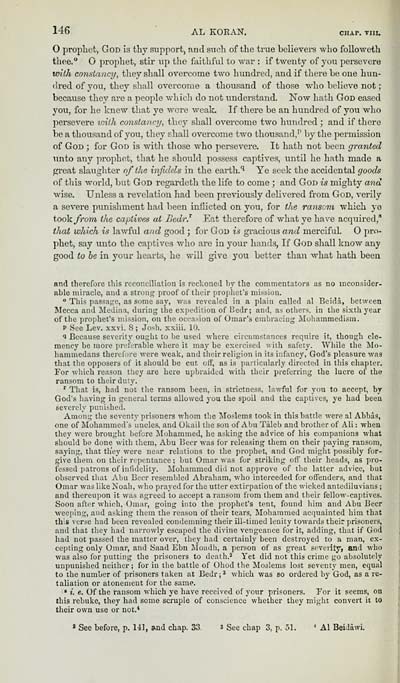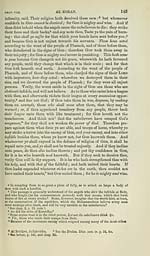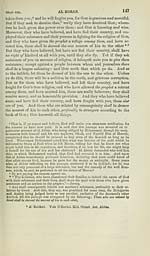Download files
Complete book:
Individual page:
Thumbnail gallery: Grid view | List view

146 AL KORiVN. CHAP. VIII.
O propliet, God is thy support, and sxicli of the true believei-s wlio followeth
thee." prophet, stir up the faithful to war : if twenty of you persevere
with constancy, they shall overcome two hundred, and if there be one hun-
dred of you, they sliall overcome a thousand of those who believe not ;
because they are a people which do not understand. Now hath God eased
you, for he knew that ye were weak. If there be an hundred of you who
persevere vnth constancy, tlicy shall overcome two hl^ndred ; and if there
be a thousand of you, they shall overcome two thousand,'' by the permission
of God ; for God is witli those who persevere. It hath not been granted
imto any prophet, that he should possess captives, until he hath made a
gi-eat slaughter of the infidels in the earth. '^ Ye seek the accidental goods
of this world, but GoD regardeth the life to come ; and God is mighty and
wise. Unless a revelation had been preWously delivered from God, verily
a severe punishment had been inllicted on you, for the ransom which yo
tooky*roTO the captives at Bedr.^ Ei^t therefore of what ye have acqiiired,*
that which is lawful and good ; for God is gracious and merciful. O pro-
phet, say uuto tlie captives who ai-e in your hands. If God shall know any
good to he in your hearts, he will give you better than what hath been
and therefore this reconciliation is reckoned by the commentators as no inconsider-
able miracle, and a strong proof of their prophet's mission.
° Tills passaffc, as some say, was revealed in a plain called al Beida, between
Mecca and Medina, during the expedition of Bedr; and, as others, in the sixth year
of the prophet's mission, on the occasion of Omar's embracing Mohammedisni.
P See Lev. xxvi. 8; Josh, xxiii. 10.
<J Because severity ought to be used where circumstances require it, though cle-
mency be more preferable where it may be exercised with safety. While the Mo-
hammedans therefore were weak, and their religion in its infancy, God's pleasure was
that tlie opposers of it should be cut off, as is particularly directed in this chapter.
For wliich reason they are here upbraided with their preferring the lucre of the
ransom to their duty.
*■ That is, had not the ransom been, in strictness, lawful for you to accept, by
God's having in general terms allowed you the spoil and the captives, ye had been
severely punished.
Among the seventy prisoners whom the Moslems took in this battle were al Abbas,
one of Mohammed"s uncles, and Okail the son of Abu Taleb and brother of All : when
they were brought before Mohammed, he asking the advice of his companions what
should be done with them, Abu Beer was for releasing them on their paying ransom,
saying, that th'ey were near relations to the prophet, and God might possibly for-
give them on their repentance ; but Omar was for striking off their heads, as pro-
fessed patrons of infidelity. Mohammed did not approve of the latter advice, but
observed that Abu Beer resembled Abraham, who interceded for offenders, and that
Omar was like Noah, who prayed for the utter extirpation of the wicked antediluvians ;
and thereupon it was agreed to accept a ransom from them and their fellow-captives.
Soon after which, Omar, going into the prophet's tent, found him and Abu Beer
weeping, and asking them the reason of their tears, Mohammed acquainted him that
this verse had been revealed condemning their ill-timed lenity towards their prisoners,
and that they had narrowly escaped the divine vengeance for it, adding, that if God
had not passed the matter over, they had certainly been destroyed to a man, ex-
cepting only Omar, and Saad Ebn Jloadh, a person of as great spverityi and who
was also for putting the prisoners to death.' Yet did not this crime go absolutely
unpunished neither; for in the battle of Ohod the Moslems lost seventy men, equal
to the number of prisoners taken at Bedr;^ which was so ordered by God, as a re-
taliation or atonement for the same.
' i. e. Of the ransom which ye have received of your prisoners. For it seems, on
this rebuke, they had some scruple of conscience whether they might convert it to
their own use or not.*
* See before, p. 141, and chap. 33 s See chap 3, p. 51. ^ Al Beidawi.
O propliet, God is thy support, and sxicli of the true believei-s wlio followeth
thee." prophet, stir up the faithful to war : if twenty of you persevere
with constancy, they shall overcome two hundred, and if there be one hun-
dred of you, they sliall overcome a thousand of those who believe not ;
because they are a people which do not understand. Now hath God eased
you, for he knew that ye were weak. If there be an hundred of you who
persevere vnth constancy, tlicy shall overcome two hl^ndred ; and if there
be a thousand of you, they shall overcome two thousand,'' by the permission
of God ; for God is witli those who persevere. It hath not been granted
imto any prophet, that he should possess captives, until he hath made a
gi-eat slaughter of the infidels in the earth. '^ Ye seek the accidental goods
of this world, but GoD regardeth the life to come ; and God is mighty and
wise. Unless a revelation had been preWously delivered from God, verily
a severe punishment had been inllicted on you, for the ransom which yo
tooky*roTO the captives at Bedr.^ Ei^t therefore of what ye have acqiiired,*
that which is lawful and good ; for God is gracious and merciful. O pro-
phet, say uuto tlie captives who ai-e in your hands. If God shall know any
good to he in your hearts, he will give you better than what hath been
and therefore this reconciliation is reckoned by the commentators as no inconsider-
able miracle, and a strong proof of their prophet's mission.
° Tills passaffc, as some say, was revealed in a plain called al Beida, between
Mecca and Medina, during the expedition of Bedr; and, as others, in the sixth year
of the prophet's mission, on the occasion of Omar's embracing Mohammedisni.
P See Lev. xxvi. 8; Josh, xxiii. 10.
<J Because severity ought to be used where circumstances require it, though cle-
mency be more preferable where it may be exercised with safety. While the Mo-
hammedans therefore were weak, and their religion in its infancy, God's pleasure was
that tlie opposers of it should be cut off, as is particularly directed in this chapter.
For wliich reason they are here upbraided with their preferring the lucre of the
ransom to their duty.
*■ That is, had not the ransom been, in strictness, lawful for you to accept, by
God's having in general terms allowed you the spoil and the captives, ye had been
severely punished.
Among the seventy prisoners whom the Moslems took in this battle were al Abbas,
one of Mohammed"s uncles, and Okail the son of Abu Taleb and brother of All : when
they were brought before Mohammed, he asking the advice of his companions what
should be done with them, Abu Beer was for releasing them on their paying ransom,
saying, that th'ey were near relations to the prophet, and God might possibly for-
give them on their repentance ; but Omar was for striking off their heads, as pro-
fessed patrons of infidelity. Mohammed did not approve of the latter advice, but
observed that Abu Beer resembled Abraham, who interceded for offenders, and that
Omar was like Noah, who prayed for the utter extirpation of the wicked antediluvians ;
and thereupon it was agreed to accept a ransom from them and their fellow-captives.
Soon after which, Omar, going into the prophet's tent, found him and Abu Beer
weeping, and asking them the reason of their tears, Mohammed acquainted him that
this verse had been revealed condemning their ill-timed lenity towards their prisoners,
and that they had narrowly escaped the divine vengeance for it, adding, that if God
had not passed the matter over, they had certainly been destroyed to a man, ex-
cepting only Omar, and Saad Ebn Jloadh, a person of as great spverityi and who
was also for putting the prisoners to death.' Yet did not this crime go absolutely
unpunished neither; for in the battle of Ohod the Moslems lost seventy men, equal
to the number of prisoners taken at Bedr;^ which was so ordered by God, as a re-
taliation or atonement for the same.
' i. e. Of the ransom which ye have received of your prisoners. For it seems, on
this rebuke, they had some scruple of conscience whether they might convert it to
their own use or not.*
* See before, p. 141, and chap. 33 s See chap 3, p. 51. ^ Al Beidawi.
Set display mode to: Large image | Transcription
Images and transcriptions on this page, including medium image downloads, may be used under the Creative Commons Attribution 4.0 International Licence unless otherwise stated. ![]()
| Early Gaelic Book Collections > J. F. Campbell Collection > Koran: or, Alcoran of Mohammed > (300) |
|---|
| Permanent URL | https://digital.nls.uk/77137395 |
|---|
| Description | Volumes from a collection of 610 books rich in Highland folklore, Ossianic literature and other Celtic subjects. Many of the books annotated by John Francis Campbell of Islay, who assembled the collection. |
|---|
| Description | Selected items from five 'Special and Named Printed Collections'. Includes books in Gaelic and other Celtic languages, works about the Gaels, their languages, literature, culture and history. |
|---|

